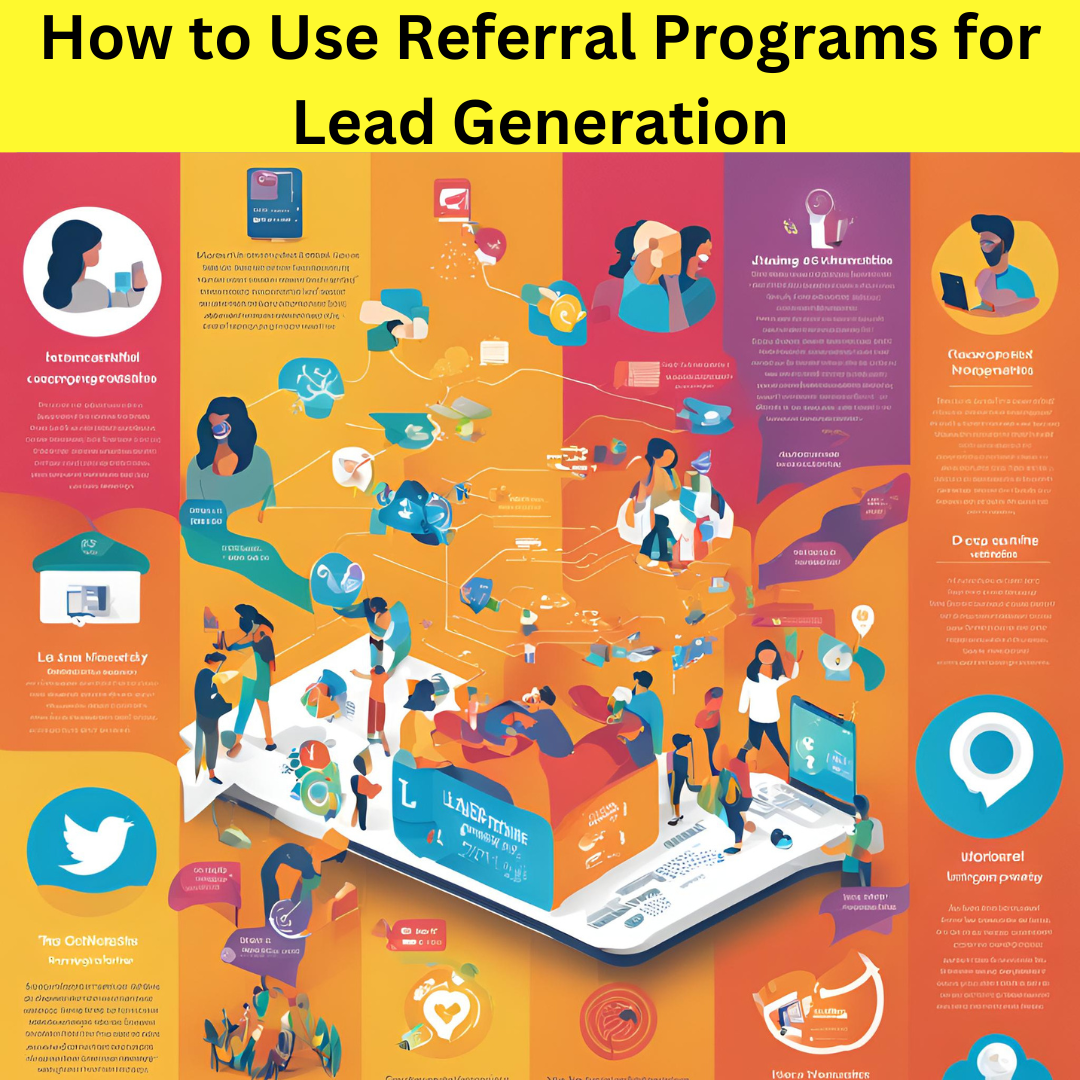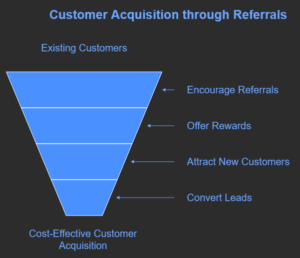
Referral programs are a marketing strategy that encourages existing customers to recommend a business’s products or services to others in exchange for rewards, such as discounts, freebies, or other incentives. The programs tap into the most trusted form of marketing-word-of-mouth-to expand a company’s reach and attract new customers.
Referral programs are essential in lead generation since people trust recommendations better than advertisements from their close friends, family, or colleagues. Referral sources often convert into higher converters since they have a history of trust and credibility attached. Moreover, referral programs benefit in cost efficiency by making the acquisition of customers cheaper on one hand while simultaneously strengthening customer retention.
Business referral programs can also be integrated with other forms of marketing and may make a company appealing and straightforward to refer people. They can encourage brand ambassadors who are satisfied with their experiences with the businesses to bring in new customers while reinforcing loyalty towards a particular brand. Referral programs may, therefore, provide companies with a robust, long-term growth driver.
Benefits of Using Referral Programs for Lead Generation
Referral programs have numerous compelling advantages when it comes to lead generation. One of the key benefits is high-quality leads. Leads generated by referrals from friends, family, or colleagues are more likely to pay because they have been received from trusted sources. Most of the time, it shortens the decision cycle and leads to higher conversion rates.
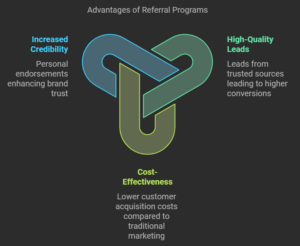
Another key benefit is that referral programs are cost-effective. In contrast to traditional channels of marketing that require a great deal of money in advertising and promotions, referral programs come with a relatively lower customer acquisition cost (CAC). The cost would generally only be the reward given out, which may be significantly cheaper than an all-out campaign.
Referrals also increase the credibility of a brand. Whenever someone refers to a product or service, it comes with a personal endorsement. This is what makes potential customers feel more confident about their decisions. Such credibility can work wonders in conversion rates and build brand reputation.
Referral programs finally create customer loyalty. Since rewards are offered for successful referrals, customers tend to stay with the brand and promote repeat interactions. With new and existing customers incentivized, a business can maintain a loyal customer base while still expanding through word of mouth.
Types of Referral Programs
There are various forms of referral programs designed to meet specific business needs and customer motivations. Here is a quick overview of the most common types:
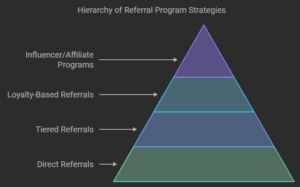
Direct Referral Programs
The single reward for each successful referral that these programs offer is paid once. They are very direct and easy to implement, which explains why they are so popular for businesses that want to quickly ramp up customer acquisition. A company may offer a discount or a free product to the referrer and the new customer after a successful referral.
Tiered Referral Programs
In tiered programs, benefits are incremented on the success of every referral. For example, to refer as many people as possible, the incentive could increase with progressively better rewards: a tiny discount on the first successful referral and unlock a really big prize at the fifth successful referral to continue referral.
Loyalty-based referral programs
These programs tie incentives for referrals to customer loyalty, rewarding users for long-term engagement. When referrals are combined with loyalty points or special benefits, the business fosters ongoing relationships that bring in repeat business and more referrals over time.
Influencer and Affiliate Programs
These include influencer or affiliate marketing, where the brand partners with influencers or affiliates who promote the brand to their followers in exchange for a commission or other rewards. This way, the brand can leverage the influencer’s audience to spread its reach and attract new, high-quality leads.
Each of these has different benefits that allow businesses to choose the most effective strategy for their goals and target audience.
Key Elements of a Successful Referral Program
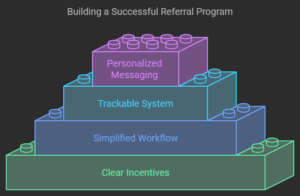
A successful referral program depends on several key elements that ensure its effectiveness and appeal. Clear incentives are important, offering attractive rewards for both the referrer and the referee, such as discounts, freebies, or exclusive perks. These rewards should be valuable enough to motivate participation. Such incentives, therefore, must be valuable enough to earn the desired participation. Simplified workflow is also as important whereby customers are able to simply refer other people on a single page with a link, QR, or shareable social media prompt. For greater transparency and efficiency, this process needs to be trackable.
Using tools to monitor referrals track conversions and measure performance enables companies to see what works and, therefore, fine-tune their approach. Finally, personalized messaging is that extra touch, in that it makes referral invites more appealing as it addresses a customer directly and emphasizes the particular benefits they and their friends would gain. All these form a seamless and engaging referral experience that drives participation and generates high-quality leads.
Steps to Implement an Effective Referral Program
A proper, successful referral program should be implemented in a designed manner so that it resonates well with your audience and serves the business goals.
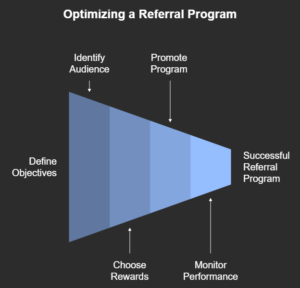
Define Objectives
Begin by defining what you want to accomplish with the referral program. It may be lead generation, conversion of customers, or brand loyalty. Once these well-defined objectives are clear, it will help your strategy and allow you to measure the outcome appropriately.
Identify who will gain the most from your program. Knowing your ideal referral and referrer will help design the program to their interest, hence increasing engagement and participation.
That way, the right people hear your message, which increases your possibilities of succeeding.
Choose rewards that resonate with your target audience. These can be discounts, freebies, loyalty points, or exclusive privileges. The incentives should be worthwhile enough to encourage participation yet align with your brand’s value proposition and budget.
Promote the Program
Communicate through various channels, such as email marketing, social media, and in-app notifications. Consistent messaging across all channels makes sure your audience knows about the program and how to participate for maximum reach and engagement.
Monitor and Optimize
Continuously track your referral program’s performance with analytics tools. Track metrics such as a number of referrals, conversion rates, and customer acquisition cost. Use this information to refine the program, improve incentives, or simplify processes to ensure continued success and growth.
Tools and Platforms for Managing Referral Programs
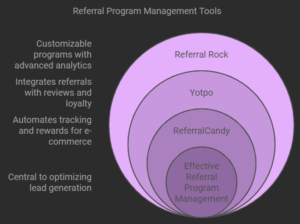
To manage referral programs properly, a firm needs the right tools for efficiency and better performance. Well-established platforms like ReferralCandy, Yotpo, and Referral Rock have features suited to businesses of different sizes. ReferralCandy stands out with automatic tracking and rewarding distribution, especially suitable for e-commerce companies. On the other hand, Yotpo brings referrals, customer reviews, and loyalty programs all together in a totally comprehensive customer engagement platform.
Referral Rock is multi-industry with customizable programs and advanced analytics. A few of the other key features to look out for in these referral tools include automation of tracking and reward distribution, analytics to monitor metrics such as referral and conversion rates, and integration with CRM, email marketing, and e-commerce platforms. These features are much integrated, ensuring that performance can be easily managed and optimized for continued lead generation and growth.
Real-Life Examples of Successful Referral Programs
Referral programs have served as the most crucial growth drivers of some of the world’s most successful brands, like Dropbox and Airbnb, where the companies used this as a primary strategy to push for exponential user growth.
Dropbox offered an easy yet very powerful referral program with free additional storage for the referrers and referees. This universal need for more cloud storage tapped by Dropbox made its users its brand advocates. This made the company grow from 100,000 users to over 4 million in just 15 months. Takeaway: A mutually rewarding scheme would drive more active referrals, which could create a high growth rate that could be sustained.
Similarly, Airbnb came up with a referral program that granted travel credits to both the referrer and the referee. This was a great strategy to tap into the want for affordable travel experiences and had existing users bring friends on board. By this, Airbnb exponentially increased its number of users while keeping them loyal customers. Lesson: Custom incentives to your product or service lead to a lot of emotions and encourage user participation.
Both brands showed that the keys to success are incentives, simple referral processes, and valuable rewards. Lessons from these examples can be learned and used to design an effective referral program that not only produces leads but also long-term customer loyalty.
Conclusion
Referral programs are an extremely strong way of garnering quality leads, minimizing cost in customer acquisition, and giving back value through the virtue of word-of-mouth when designed correctly – incentivizing customers by making clear incentive terms and streamlining process flow as well as optimizing tracking systems. The advantages are not only acquiring new customers but also building loyalty in customers, rewarding existing clients, and turning them into long-term brand advocates.
A successful referral program would thus mean that clear objectives are outlined, that the target audience is appropriate, and appeals are selected so they will attract desirable incentives, effectively promote the program, and continue to monitor and optimize.
Starting a referral program makes good sense if you want to upgrade the lead generation strategy with deeper customer relationships. The right approach will help your business not only grow an extended customer base but also build a loyal community of loyal supporters who will always encourage and endorse your brand for long periods of time.
